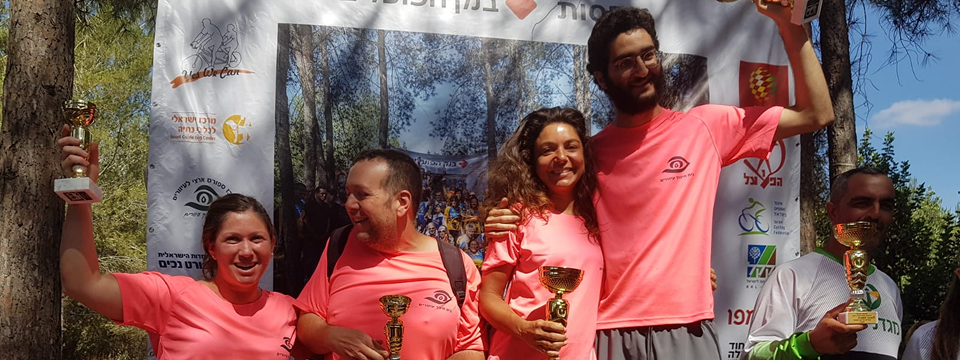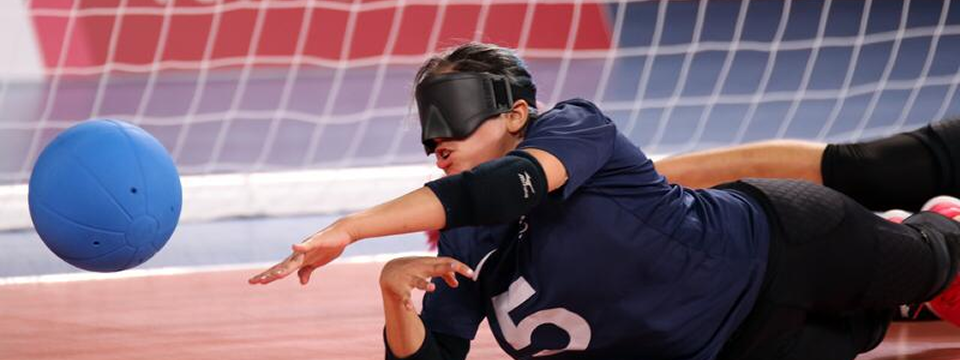Beyond the physical benefits, sports provide an opportunity for social integration, creating a space where students can connect with their peers, develop leadership skills, and learn valuable life lessons about perseverance and determination.
The National Sports Center for the Blind in Jerusalem serves as a hub for blind athletes and community members, offering a variety of adapted sports and fitness opportunities. Through carefully designed programs and specialized training, we empower individuals with visual impairments to excel in sports, challenge themselves, and participate in both recreational and competitive athletic activities.

The Trabin Family Fitness Center
A state-of-the-art fitness and weight room designed to provide blind and visually impaired individuals with a fully accessible workout experience. Equipped with adapted strength and cardio equipment, the center allows athletes of all levels to train independently, build strength, and improve overall fitness in a safe and supportive environment.
The Trabin Family Fitness Center promotes physical wellness, mobility, and confidence, ensuring that every individual, regardless of ability, has the opportunity to lead an active and healthy lifestyle.

The National Sports Center For The Blind
The National Sports Center for the Blind in Jerusalem is a fully equipped facility that provides sports services to both blind and sighted individuals in an inclusive and integrated environment. The center features a semi-Olympic indoor swimming pool, sauna, sports halls, judo hall, treatment rooms, a sensory Snoezelen room, a fitness studio, and a gym.
Over 450 blind and visually impaired individuals currently benefit from the center's services free of charge. Additionally, spouses and siblings up to the age of 18 are welcome to use the facilities, ensuring a supportive family-friendly environment.
The center is home to various adapted sports programs, including goalball, swimming, tandem cycling, running, judo, and chess for the blind. Many of these programs operate within national leagues and international competitions, allowing blind athletes to train, compete, and achieve excellence on a professional level.

National Sports Center For The Blind – A Community Hub
The National Sports Center for the Blind serves as a sports and recreation hub for both blind and sighted individuals. The facility is open to the general public, promoting full integration and accessibility while maintaining specialized services for visually impaired athletes.
The center offers free membership to visually impaired individuals and provides discounted access for their spouses and children under 18. Separate activity sessions are available for men and women, making the center an inclusive space for all community members.
The sports center features: a semi-Olympic indoor swimming pool, a gym and fitness studio, a judo and therapeutic sports hall, a Snoezelen sensory room for relaxation and therapy, a multipurpose sports hall for team sports.
The facility hosts approximately 1,000 participants per year, ensuring that blind community members have an appreciation for our integral services which strongly assist them in overcoming their challenges. With this integration, blind and visually impaired individuals have the opportunity to train, compete, and lead active lifestyles.

Sports Programs For The Blind And Visually Impaired
JIB is home to blind athletes from across Israel, offering them customized sports training that enhances physical fitness, mobility, and coordination. Physical activity plays a vital role in developing spatial awareness, body control, and movement confidence, helping visually impaired individuals navigate their surroundings with greater ease.
Beyond fitness, sports activities encourage teamwork, cooperation, persistence, and social connection. Many participants report that integrating sports into their lives leads to significant improvements in their social status, economic opportunities, and emotional well-being.
To support athletes at all levels, JIB organizes training camps where participants can train, interact with peers, and develop their athletic potential in a supportive environment. These camps offer full accommodation and provide opportunities for personal growth and shared experiences beyond training hours.

Goalball And The Paralympics
Goalball is a competitive sport specifically designed for blind and visually impaired athletes. Played in a silent indoor hall, the game features teams of three players on each side, defending a nine-meter-wide goal. Players must rely on their hearing and spatial awareness to track a ball embedded with bells, aiming to score against the opposing team while defending their own goal.
Israel’s national goalball teams, both men’s and women’s, train at the sports center and compete in international tournaments under the International Blind Sports Association (IBSA). The women’s team ranks among the top goalball teams worldwide, having placed sixth in global competitions.
The goalball league operates with two national divisions, hosting eight league tournaments annually. Players, coaches, and support staff stay at JIB’s residential facilities during competitions, fostering a strong athletic community.
Read about our Medal award-winning teams in this article about their recent achievements.
In addition to Goalball, we have also sent members to compete in other Paralympics events, and we are especially enthusiastic about the recent successes of our Chess Team.

Swimming And Water Therapy
The semi-Olympic indoor pool at the National Sports Center provides swimming lessons, water therapy, and free swim sessions for blind and visually impaired individuals. Water-based activities enhance motor function, relaxation, and physical conditioning in a low-impact environment.

Tandem Cycling
Tandem cycling allows blind and sighted individuals to ride together, promoting cooperation, trust, and teamwork. The program operates in multiple cities, including Jerusalem, Rosh HaAyin, and Beer Sheva, and is designed to enhance both physical fitness and social connection.

Running
Running programs for blind athletes operate at several major athletic centers in Israel, including the National Athletics Stadium in Hadar Yosef (Tel Aviv), the University Stadium in Jerusalem, and the athletics stadium in Kiryat Haim (Haifa). These programs train blind and visually impaired runners alongside sighted guides, preparing them for local and international competitions.

Chess
The Blind Chess Players Association operates under JIB’s umbrella, providing accessible chess tournaments and league play for visually impaired competitors. Using specially designed tactile chess boards, players rely on their sense of touch to navigate the game. Blind chess tournaments take place three times a year, with participants competing in a national league governed by the Israeli Chess Association.

Therapeutic Sports
Therapeutic sports programs serve children and teenagers with blindness, visual impairments, motor impairments, developmental delays, ADHD, and emotional challenges. These activities improve coordination, motor skills, and confidence while encouraging students to engage in teamwork and perseverance.

Summer Sports Camp
Every summer, JIB hosts a five-day intensive sports camp for blind and visually impaired teenagers, offering a diverse range of adapted athletic activities. Camp participants explore goalball, judo, gym training, sailing, tandem cycling, track and field, swimming, and sports-related workshops.
The summer camp provides a unique opportunity for young athletes to train, learn, and bond with peers in a fully immersive sporting environment.
Our summer camps are based on a strong sense of diversity and inclusion- blind and visually impaired campers represent all populations of Israeli society.

About Our Programs
The Jewish Institute for the Blind provides a wealth of programs and services adapted to suit the needs, interests, and capabilities of children and adults in the Blind and Visually Impaired community. These programs help guide students as they forge their own paths toward independence through education, rehabilitation, health, social welfare, and a caring, knowledgeable staff.




